Introduction
Many people in the UK look for free online courses in health and social care to gain skills and confidence in caregiving roles. These courses often provide CPD accreditation or certificates upon completion. Learners can access practical training on topics such as safeguarding, infection control, mental health awareness, and equality. Numerous platforms offer these courses at no cost through funding or free tiers.
Government-funded schemes or charity-supported platforms provide many of these courses. Learners benefit from flexible study around work or caring commitments. Platforms include Reed, Alison, LearnPac, and Care Learning, offering recognised course content and certification (Reed, Reddit, Reddit, Wikipedia, Reddit, LearnPac Systems). Study paths remain accessible to both new entrants and existing care staff seeking refreshers.
Course Types and Providers
Various free courses suit health and social care learners. Providers deliver regulated qualifications like Level 2 certificates or CPD training. They include topics such as:
- Safeguarding vulnerable people
- Preparing to work in adult social care
- Safe handling of medication
- Dignity and person‑centred care
- Infection prevention and control
Reed.co.uk lists multiple regulated CPD courses across these topics with free completion and tutor support (Alison, Reed, heartofyorkshire.ac.uk). LearnPac offers free training modules with certification aligned to care standards for online learners (LearnPac Systems). Care Learning presents short modules focused on person‑centred practice, equality, and safeguarding, tailored to England’s regulations (Care Learning).
Eligibility and Access
Learners must be aged nineteen or older. Residency in the UK remains required. Most courses require no prior qualifications. Registration involves simple sign-up forms. Providers issue certificates digitally at no extra cost in most cases. Some funded courses favour unemployed individuals or learners on benefits (Free2Learn, heartofyorkshire.ac.uk). A few providers request proof of entitlement or a brief eligibility check.
Learners may need a compatible device and reliable internet connection. Placement or workplace access remains optional for knowledge-based courses. Learners with care roles benefit most. Essential online skills help complete assessments and quizzes.
Course Delivery and Structure
Courses deliver content through web-based modules, videos, quizzes, and practical tasks. Training spans one to twelve weeks depending on course depth. Many courses operate entirely online and self‑paced.
Providers offer tutor support or community forums. Students submit assignments such as scenario responses or reflective logs. Progress tracking remains available via dashboards or course portals. Certificates issue after passing knowledge checks. Many platforms offer CPD‑accredited certificates or regulated Level 2 credentials.
Benefits of Free Courses
Learners gain knowledge without financial commitment. They build confidence in handling care-related tasks. They update skills on legislation, safeguarding, and care standards. Certificates boost CVs and may satisfy employer training requirements. Study fits personal schedules and learning preferences.
Many providers align content with current care policies and legal frameworks. Knowledge gained strengthens service delivery and improves confidence. Learners access a range of courses from short awareness modules to full regulated Level 2 certificates.
Progression and Next Steps
Learners may progress to further courses or vocational qualifications. They often use these foundations to prepare for NVQ or Diploma courses. Skills in care planning, safeguarding, and communication support entry into regulated care roles. Employers value candidates who complete multiple care-focused modules. Learners may then apply for funded Level 2 or Level 3 training.
Study pathways include apprenticeship routes, foundation programmes, or regulated qualifications. Short courses serve as stepping stones. Completion of several modules demonstrates commitment.
Testimonials and Feedback
Users report that short free courses help improve performance in their roles. Many appreciate flexibility and the relevance of practical modules. Tutor feedback earns high praise for clarity and helpfulness. Learners state that checking off a module feels motivating when combined with real work scenarios. Certificate recognition motivates further study.
Course Examples
ShortOnlineCourses platform offers Level 2 courses in safe handling of medication, end‑of‑life care, and nutrition (shortonlinecourses.co.uk). These courses align with regulated qualifications and support sector requirements. They offer study modules with assessment and certification. Learners complete each course online and receive download certificates.
Courses are free via selected providers. Requirements remain minimal. They defend against potential regulatory gaps by teaching current legal frameworks.
Summary
Free health and social care online courses offer a practical way to boost skills. Learners access topic-specific training ranging from safeguarding to mental health awareness. Certificates come without cost for most learners. Course platforms support flexible, independent learning with practical application. These courses support career development, regulated qualification preparation, and greater confidence in care roles.
Providers frequently update content to meet current sector standards. They supply CPD credentials and ensure modules remain relevant. These learning opportunities prepare individuals for both care roles and further study routes.
Read More:







